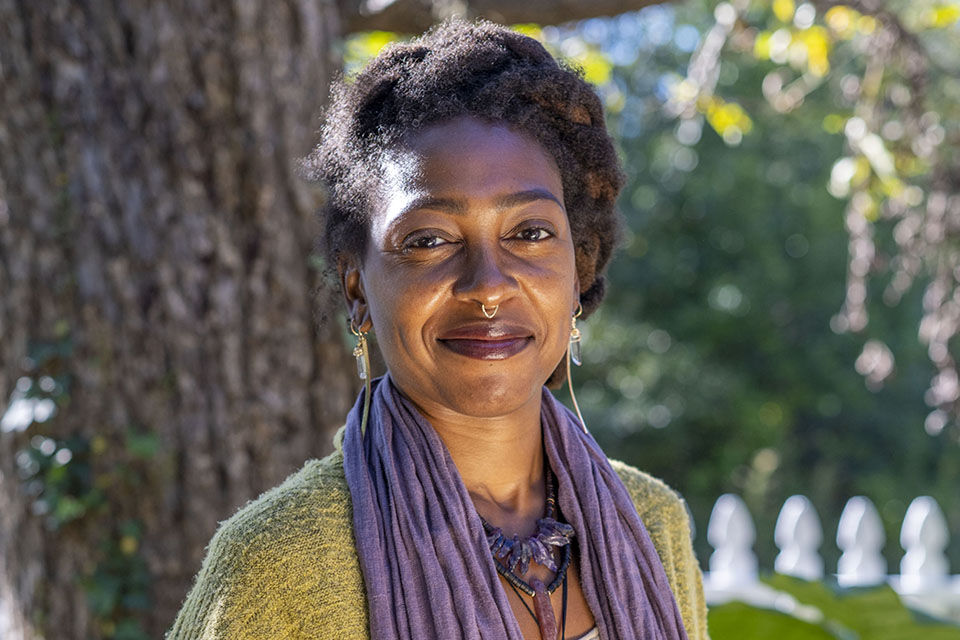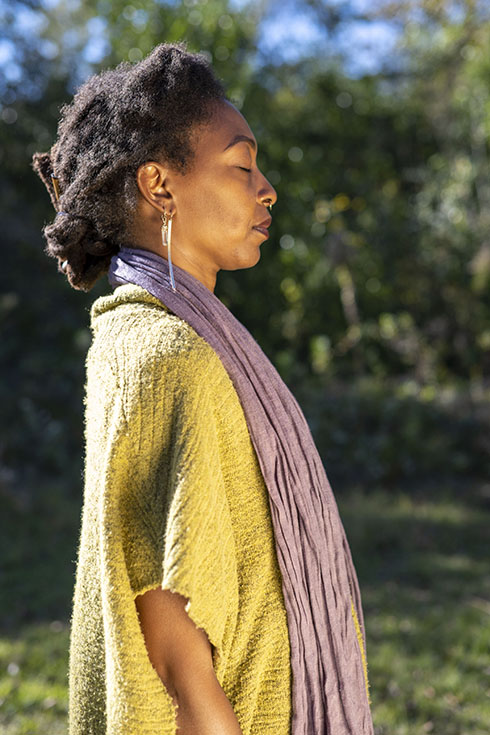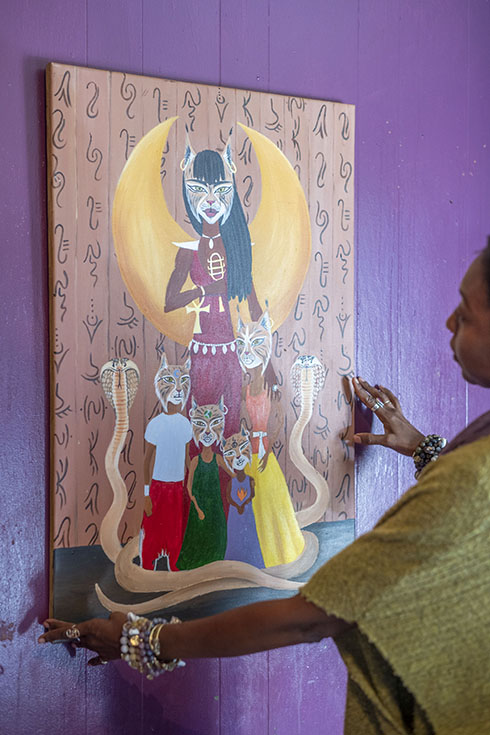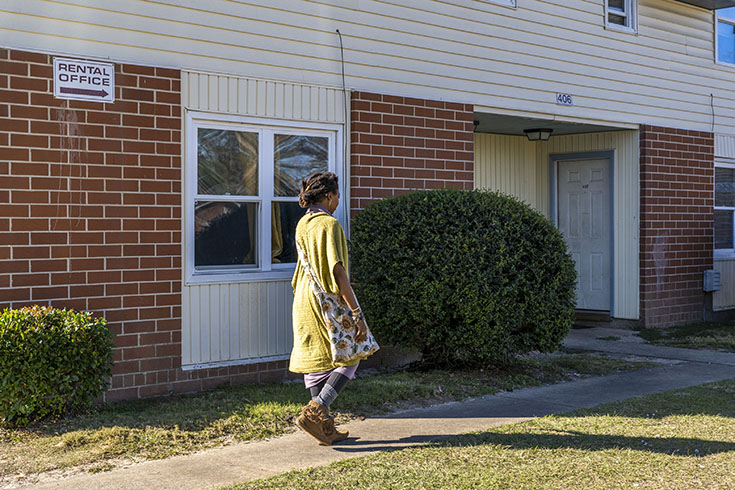C.Y.: No matter what happens, my mother has my back

C.Y. is an African American woman in her early forties from southern Georgia. A talented singer, songwriter, and artist and the mother of four young children, C.Y. works full-time as a site manager for a low-income apartment complex.
Photo Credit: Nydia Blas (all photos)
C.Y. was born and raised in a small, racially segregated town in southern Georgia. The railroad tracks that run through the town mark a racial boundary, separating the part of town in which C.Y. and other African Americans live from the white neighborhoods which are also distinguished by their public services and amenities.
Looking back on her childhood, C.Y. now realizes that her family had been poor: “We were not rich. We were probably in the poverty category.” Her parents both worked in low-wage jobs, her father at an animal feed store and her mother as a seamstress in a factory. Though money was tight, as a child she never felt deprived: “My mother made me feel like we weren’t lacking anything. I never felt that we were poor.” Whether it was by using her sewing skills to create fashions or combing through thrift stores for used toys, her mother always made sure that the children had much of what they wanted. C.Y. also grew up with a sense of security about their home. They lived in the house that her mother had inherited from her own mother. Since they owned a home, they did not have to worry about paying rent or finding a place to live.
 C.Y. is a deeply creative and spiritual person who has always forged her own, often unconventional, path. Her mother has always supported her choices. Very early on, her mother recognized her daughter’s musical gifts. C.Y. came out of the womb singing, according to her mother. C.Y.’s first memory is of being two years old, climbing up in the bathroom to look at herself in the mirror as she sang, using her hairbrush as a microphone. By the time she was sixteen she knew she wanted to be a professional singer and hoped to make a living by performing and recording music.
C.Y. is a deeply creative and spiritual person who has always forged her own, often unconventional, path. Her mother has always supported her choices. Very early on, her mother recognized her daughter’s musical gifts. C.Y. came out of the womb singing, according to her mother. C.Y.’s first memory is of being two years old, climbing up in the bathroom to look at herself in the mirror as she sang, using her hairbrush as a microphone. By the time she was sixteen she knew she wanted to be a professional singer and hoped to make a living by performing and recording music.
After high school, C.Y. attended a public university in Georgia, to the great joy of her family and especially her grandmother: “She was so proud of me. I was either the first or one of the first of her grandchildren to go to college.” In college C.Y. joined a rap group and became immersed in the world of music.
In her sophomore year C.Y. received devastating news. Her grandmother, a pillar of the family, had been stabbed to death by an intruder in her public housing apartment. Twenty years later, the murder remains unsolved. C.Y. feels that the case was never properly investigated by the police.
Traumatized by her grandmother’s brutal death and feeling increasingly detached from her courses, C.Y. decided to leave college and focus her energies on breaking into the music business. She took a retail job in Atlanta to pay for her living expenses while she performed and recorded her own songs. By her late twenties she had signed with an independent record label in California. The company sent her on several tours to promote her music. It was a demanding way of life that C.Y. began to question, especially when she thought about raising children.
C.Y. met a man who she felt was her soulmate. They married and soon she was pregnant with her first child. The birth of her daughter was a moment of profound transformation for C.Y. She felt a deep sense of love and affirmation: “Your mom always tells you, ‘I love you.’ She tries to uplift you. But . . . when you get out in the world as an adult, it doesn't feel like that," especially when you are an African American woman living in the South. Having a daughter made her reconsider. “You know what? I am worthy of love.” C.Y. stopped touring and recording and decided to devote herself to raising her little daughter.
 After her second child was born, C.Y. thought about returning to college to finish her degree, but how could she manage caring for her children, holding down a job and going to college? When her mother offered to help, C.Y. moved back to her childhood home. She and her family could live rent-free, and her mother stepped up to help with childcare, so C.Y. was able to graduate with a bachelor’s degree in art.
After her second child was born, C.Y. thought about returning to college to finish her degree, but how could she manage caring for her children, holding down a job and going to college? When her mother offered to help, C.Y. moved back to her childhood home. She and her family could live rent-free, and her mother stepped up to help with childcare, so C.Y. was able to graduate with a bachelor’s degree in art.
Over the years, C.Y. has continued to count on her mother for support. Today she and her four children (ages 3, 6, 8 and 11) live with her parents in her childhood home. Her mother has supported C.Y.’s decision to home-school her children. C.Y. is an ardent believer in unschooling, a philosophy that advocates informal learning in which children learn through their natural life experiences, developing their personal interests and curiosity. C.Y.’s own early school years were a negative experience. School was a place where her talents and creativity were not encouraged and were often discouraged. She does not want her children to have the same experience.
Earlier this year, after ten years of marriage to a man who cycled in and out of the workforce, C.Y. decided to separate from her husband. Even though she found him to be a good father and continues to see him as her best friend, he had trouble keeping a job and could not support the family. The separation has been heartbreaking for C.Y. She worried about taking care of her children without his help but she’s managing with the help of her mother.
 Today C.Y. works as a site manager for a low-income housing complex. She monitors the property, addresses tenants’ problems, makes sure bills are paid, maintains quiet, and tries to resolve conflicts. At times she faces the fury of tenants who need to vent about the world. But she stays calm, drawing on skills she has cultivated through many years of yoga practice.
Today C.Y. works as a site manager for a low-income housing complex. She monitors the property, addresses tenants’ problems, makes sure bills are paid, maintains quiet, and tries to resolve conflicts. At times she faces the fury of tenants who need to vent about the world. But she stays calm, drawing on skills she has cultivated through many years of yoga practice.
Over the years C.Y.’s creativity, strength and spirituality have enabled her to carve her own unique path in the world. Her mother has been a consistent pillar of support. As C.Y. says: “no matter what happens, my mother has my back.”